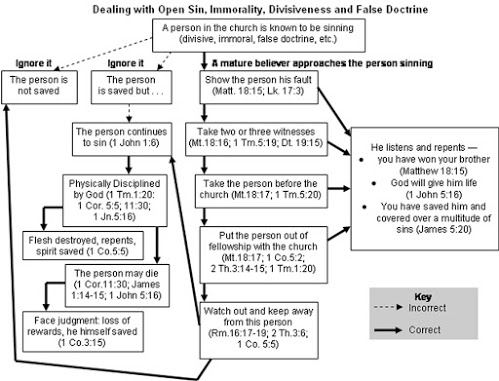
Chapter 17

Jude 22-23
And refute so as to convict some who dispute with you, and on some have mercy who waver and doubt. Strive to save others, snatching them out of the fire; on others take pity but with fear, loathing even the garment spotted by the flesh and polluted by their sensuality.
[Amplified Bible]
Numerous readers have written to inquire about how Yahweh would have them relate to people involved in homosexual behavior. Encounters with homosexuals are becoming more common. Some Christians find themselves working with homosexuals at their place of employment. Some have family members that are homosexuals. Increasingly, believers are encountering other professing Christians who say homosexuality is acceptable. Is there a difference in the manner in which believers should relate to Christians and non-Christians who are engaging in, or supportive of, homosexual relationships? The Scriptures provide clear counsel on the matter.
I Corinthians 5:9-13
I wrote you in my letter not to associate with immoral people; I did not at all mean with the immoral people of this world, or with the covetous and swindlers, or with idolaters; for then you would have to go out of the world. But actually, I wrote to you not to associate with any so-called brother if he should be an immoral person, or covetous, or an idolater, or a reviler, or a drunkard, or a swindler– not even to eat with such a one. For what have I to do with judging outsiders? Do you not judge those who are within the church? But those who are outside, God judges. Remove the wicked man from among yourselves.
The passage of Scripture above reveals that there is a difference in how Christians are to interact with immoral people (which includes those engaged in homosexuality) in the church, and outside of the church. Christians ARE instructed to judge the evil in their midst. Christ laid out clear instructions on how church discipline is to be carried out.
Matthew 18:15-17
“If your brother sins, go and reprove him in private; if he listens to you, you have won your brother. But if he does not listen to you, take one or two more with you, so that by the mouth of two or three witnesses every fact may be confirmed. And if he refuses to listen to them, tell it to the church; and if he refuses to listen even to the church, let him be to you as a Gentile and a tax-gatherer.”

Diagram of Church Discipline
(Note that the dashed line indicates an incorrect response. The solid line, a godly response.)
The expression, “let him be to you as a Gentile and a tax-gatherer” parallels Paul’s counsel to not associate with immoral brethren, and to not even eat with them. The church has fallen into profound error as they have failed to “rightly divide” the word of God. A significant number within the body of Christ focus on a limited number of Scriptures that warn Christians against judging others. Verses such as the following are repeated ad infinitum.
Matthew 7:1-5
“Do not judge lest you be judged. For in the way you judge, you will be judged; and by your standard of measure, it will be measured to you. And why do you look at the speck that is in your brother’s eye, but do not notice the log that is in your own eye? Or how can you say to your brother, ‘Let me take the speck out of your eye,’ and behold, the log is in your own eye? You hypocrite, first take the log out of your own eye, and then you will see clearly to take the speck out of your brother’s eye.”
Contrary to many people’s belief, this passage is NOT telling Christ’s disciples to forego judging. It is a warning against hypocritical judgment. Yahshua is warning men and women that they cannot judge others by a strict and unforgiving standard, and judge themselves by a more lenient measure. This matter is clarified in other passages.
Matthew 5:7
“Blessed are the merciful, for they shall receive mercy.”
James 2:13
For judgment will be merciless to one who has shown no mercy; mercy triumphs over judgment.
Christians are repeatedly enjoined to demonstrate humility in their interactions with others. If we recognize that “all have sinned and have fallen short of the glory of God,” and that “we all stumble in many ways,” then we should manifest patience and mercy when we observe others sinning. This does not imply that Christians should tolerate sinful behavior in others, nor make peace with it. Rather, the Christian should always be mindful that when they stand before the throne of judgment they will desire for God to demonstrate mercy to them. Therefore, they should leave room for repentance, and restoration of fellowship, for their brothers and sisters who stumble in sin.
Throughout the New Testament there are just as many admonitions instructing Christians to exercise judgment, as there are cautions about judging others. It is the responsibility of believers to consider the whole counsel of God that they might arrive at the mind of Christ on this matter. I have for many years had a writing posted that seeks to obtain balance, and bring forth understanding, from the many diverse Bible passages that speak about judging. I encourage those who wish to discern this matter to study this writing.
The Issue of Judging
Both Christ and the apostle Paul make it clear that if a professing believer is engaged in immoral behavior, those who are spiritual are to confront the sinner with the intent to restore them to the path of life.
Galatians 6:1
Brethren, even if a man is caught in any trespass, you who are spiritual, restore such a one in a spirit of gentleness; each one looking to yourself, lest you too be tempted.
The heart of this matter is well summarized in the commandment to “speak the truth in love” (Ephesians 4:15). As Christians we cannot choose love over truth, nor choose truth over love. The Bible NEVER sets truth and love in contradiction to one another. It is a deceit of Satan that the world, and a growing number in the church, are acting as if truth and love are mutually exclusive of one another. Truth and Love are both manifestations of Yahweh’s character. A world that has truth, but no love, would be unbearably harsh. A world that has love, but no truth, would devolve into chaos, corruption, and unrepentant degeneracy.
The greater trend among Christianity today is to embrace love while eschewing truth. This is manifested in the “do not judge” mentality demonstrated by so many. Such believers are essentially advocating the abandonment of truth. Those who would say that a Christian has no right to judge men and women engaged in homosexual behavior, are denying the truth. Yahweh has declared such behavior to be unnatural, immoral, and that those who do such things are worthy of death (Romans 1:26-32).
Knowing that God has testified in His word that those who participate in homosexual behavior will not inherit the kingdom of God (I Corinthians 6:9-10), it is neither truthful, nor loving, to refuse to warn those who transgress in this area of the consequences of their actions. The Christian who by their words and actions leads the homosexual to believe that God will wink at their sin, and who infers that there will be no negative consequences of this immoral behavior, is behaving in a false manner. Yahweh will hold them accountable if in an attempt to “get along” they refuse to be light and salt in the midst of a dark and decaying world.
One of the ways that Christians lead others to conclude that Yahweh tolerates homosexual behavior, is by continuing in fellowship with Christians who are engaged in this immoral lifestyle. Some believers have family members who profess to be Christians who are known to be involved in immoral behavior. Neither Christ nor the apostle Paul makes any distinction between a family member who claims to be a believer, or a non-family member. The requisite response is the same. Let them be as a tax-gatherer or a Gentile. Do not associate with them. Do not even eat with them.

Some in reading this will argue that this seems unreasonably harsh, especially if the transgressor is a son or daughter. What would truly be harsh is for the child to remain unrepentant all their life and suffer the judgment of God. By refusing to fellowship with the sinner, the intent is to make known to them the seriousness of their transgression. It is to lead them to repentance. Those who put familial bonds above obedience to God are transgressing against the instructions of Yahweh and His Christ.
Luke 14:26
“If anyone comes to Me, and does not hate his own father and mother and wife and children and brothers and sisters, yes, and even his own life, he cannot be My disciple.”
Some have described the type of love demanded by God as “tough love.” We should bear in mind that the love of God did not supercede His righteous judgment even when it came to His own Son. There was no shortcut to obtaining salvation for mankind, and atonement for humanity’s sin. The Son of God had to pay the penalty of sin for mankind on the cross. Sin is a deadly serious matter.
What are Christian parents communicating to their children when they observe their children living an immoral lifestyle, yet they continue to fellowship with them, and to break bread with them? The message that is conveyed is that sin is no big deal. The fear of God is diminished in the eyes of the child, and this makes their eventual repentance and restoration to God all the more unlikely.
What if the child is not a professing Christian, but the parents are? Is the situation different? To answer the question, one needs to understand the role of authority. Authority is granted by God to uphold His government. Thus, we find in the Old Testament that parents were required to demand moral behavior of their children, or subject them to discipline.
Deuteronomy 21:18-21
“If any man has a stubborn and rebellious son who will not obey his father or his mother, and when they chastise him, he will not even listen to them, then his father and mother shall seize him, and bring him out to the elders of his city at the gateway of his home town. And they shall say to the elders of his city, ‘This son of ours is stubborn and rebellious, he will not obey us, he is a glutton and a drunkard.’ Then all the men of his city shall stone him to death; so you shall remove the evil from your midst, and all Israel shall hear of it and fear.”
The Law of Moses existed in an environment where the judgments of God were able to be carried out on a national level. Israel’s form of government was a theocracy (God rule). Later it became a monarchy, which is why Yahweh told Samuel that the people were not rejecting the prophet by demanding a king, they were rejecting God as their ruler.

Christianity exists as a spiritual kingdom. The pattern is “first the natural, then the spiritual.” Yahshua stated that His kingdom was not of this world. Christianity, therefore, is not involved with the rule of any nation upon the earth today. It cannot carry out judgment on the citizens of a nation as Israel’s leaders were required to do in the Old Testament. This is affirmed in Paul’s words to the believers in Corinth. “For what have I to do with judging outsiders? Do you not judge those who are within the church? But those who are outside, God judges.”
The church has authority over its members. It is charged with carrying out church discipline. Capital punishment in the church is excommunication. An immoral person may be restricted from further fellowship with the saints. The church does not carry out physical punishment as do the governments of the nations, but they are charged with carrying out spiritual discipline.
Parents are also given authority within the sphere of responsibility entrusted to them. They are to maintain Yahweh’s governmental order in the home. Therefore, if a child is living an immoral life, it is the parents’ responsibility to reprove the child. If the child refuses to repent, the parents must discipline the child.
Hebrews 12:9-11
Furthermore, we had earthly fathers to discipline us, and we respected them; shall we not much rather be subject to the Father of spirits, and live? For they disciplined us for a short time as seemed best to them, but He disciplines us for our good, that we may share His holiness. All discipline for the moment seems not to be joyful, but sorrowful; yet to those who have been trained by it, afterwards it yields the peaceful fruit of righteousness.
The age of the child does alter the nature of the discipline. It would be impractical for parents to excommunicate a rebellious child who is not old enough to be self-supporting. Yet, if the child is of age, and he is rebellious, or he lives an unruly, immoral life, the parents should treat the son or daughter the same as the church would treat an unrepentant sinner in their midst. They should break off fellowship, and not even eat a meal with the rebellious child. The parents must uphold the government of God. The apostle Paul asks the question, “For what son is there whom his father does not discipline?” (Hebrews 12:7).
When parents continue to let a rebellious, unruly, or immoral child live under their roof, they are neglecting to discipline the child as is their duty. If they are giving the immoral son or daughter financial, or other means of support, allowing them to share the family’s food, and participate in the fellowship of the family, they have abdicated their role of discipline. There are numerous examples in the Scriptures where parents refused to discipline their children, and the consequences for both parents and children were tragic. The priest Eli and his wicked sons, and King David and his sons Amnon and Absalom, are but two examples of a failure to discipline sons and the devastation that resulted in the families.
Christian parents should not think that because they are in an age of grace that there is any less of a need to reprove and discipline their children. As the apostle Paul stated, “Shall we continue in sin that grace might increase?” Will the grace of God render the immoral lifestyle of a child acceptable in Yahweh’s sight? Absolutely not! Yahweh’s counsel to a church under grace is the same as to the family under grace. “Remove the wicked man from among yourselves.”
Again, this discipline is intended to lead the transgressor to repentance. There is a hope that the church member, or son or daughter, who is in this way disciplined, might be ashamed, repent of their behavior, and return to fellowship with those who are spiritual, and return to fellowship with God. Paul stated that “All discipline for the moment seems not to be joyful, but sorrowful; yet to those who have been trained by it, afterwards it yields the peaceful fruit of righteousness.” Producing righteousness is the goal of God’s discipline, and it should be the goal of the Christian’s discipline as well. We must not neglect to carry out discipline because it is sorrowful.
In all areas of the Christian life it is necessary to be led of the Holy Spirit. This certainly applies to the realm of discipline. Believer’s need to seek the mind of Christ to know how to apply correction. They need to speak and act according to the leading of the Spirit. The Spirit will direct the saints to speak truth and to manifest love for the offender, seeking their ultimate welfare while keeping honor and obedience to Yahweh uppermost.
When dealing with those outside the church, and outside of one’s family, the situation is greatly altered. The apostle Paul writes:
I Corinthians 5:9-10
I wrote you in my letter not to associate with immoral people; I did not at all mean with the immoral people of this world, or with the covetous and swindlers, or with idolaters; for then you would have to go out of the world.
Christians live in the midst of a dark and immoral world. Apart from moving to the wilderness, or adopting a monastic life, it would be impossible to not have any association with immoral people. Yahweh has not called His people to come out of the world. He intends for them to remain as salt and light in the midst of a world that needs both. Christ was criticized by the Jewish religious leaders because He associated with prostitutes, drunkards, and tax collectors, all of whom were regarded as immoral. In reply He stated:
Matthew 9:12-13
“It is not those who are healthy who need a physician, but those who are sick. But go and learn what this means, ‘I desire compassion, and not sacrifice,’ for I did not come to call the righteous, but sinners.”

Yahshua and Prostitute
Luke 5:31 adds the word “repentance” to the phrase above. Yahshua came to call sinners to repentance. This should be our goal as disciples of Christ. Yahweh desires compassion upon the lost masses of this world. Yahshua came to seek and to save that which was lost. His goal is redemption, the reconciliation of God and man.
The members of Westboro Baptist Church are not manifesting compassion. Their approach lacks humility. They have no consciousness of their own need of God’s great mercy, though they too are sinners.

Westboro Baptist Church Protest
The signs carried by this professing Christian do not accurately reflect the mind of God. Yahweh does not laugh when homosexuals die. The prophet Ezekiel wrote:
Ezekiel 18:30-32
“Repent and turn away from all your transgressions, so that iniquity may not become a stumbling block to you. Cast away from you all your transgressions which you have committed, and make yourselves a new heart and a new spirit! For why will you die…? For I have no pleasure in the death of anyone who dies,” declares Yahweh God. “Therefore, repent and live.”
Yahweh desires that men might live. The wages of sin is death. Therefore Yahweh exhorts men and women to turn away from their sins that they might experience life. Christ said, “I came that they might have life, and might have it abundantly.” The apostle Paul describes Christians as divine ambassadors, kingdom representatives, of Yahweh.
II Corinthians 5:20
Therefore, we are ambassadors for Christ, as though God were entreating through us; we beg you on behalf of Christ, be reconciled to God.
Consider these words for a moment. “We beg you on behalf of Christ, be reconciled to God.” To declare such a message it is first necessary to disclose to people that they are estranged from God. Christians must tell those God sends their way that sin has separated them from God. These words of Paul also express compassion, and a sincere concern, for those who are separated from Yahweh. It is unseemly for a Christian to go about reviling, and casting insults, at those who are living sinful lives. It is not necessary to revile in order to speak the truth about sin, righteousness, and judgment.
It may seem contradictory that Christ would eat with sinners, yet He would tell His disciples to treat their own brethren as a tax collector or Gentile, refusing to fellowship with them, if they were living an immoral life, but there is a sound reason for this. Those who have been given much are held to a stricter judgment. To be given the light of truth, and to reject it is a serious matter.
As Christians we are to proclaim the kingdom of God to others. Yet, if those who hear our words resist the truth we are to move one. The apostle Paul demonstrated this in his ministry.
Acts 13:44-46
And the next Sabbath nearly the whole city assembled to hear the word of God. But when the Jews saw the crowds, they were filled with jealousy, and began contradicting the things spoken by Paul, and were blaspheming. And Paul and Barnabas spoke out boldly and said, “It was necessary that the word of God should be spoken to you first; since you repudiate it, and judge yourselves unworthy of eternal life, behold, we are turning to the Gentiles.
Yahweh has said that He will not strive with men forever. As Christians we must be sensitive to the opportunities around us, remaining sensitive to the guidance of the Spirit to know when to speak, and to whom. He will provide us opportunities. We must impress upon people the urgency of the matter. Yahweh will not continually draw a man or woman to Himself. If they repeatedly harden their heart they may miss their opportunity for repentance.
Luke 13:6-9
He also spoke this parable: “A certain man had a fig tree planted in his vineyard, and he came seeking fruit on it and found none. Then he said to the keeper of his vineyard, ‘Look, for three years I have come seeking fruit on this fig tree and find none. Cut it down; why does it use up the ground?’ But he answered and said to him, ‘Sir, let it alone this year also, until I dig around it and fertilize it. And if it bears fruit, well. But if not, after that you can cut it down.'”
One thing I would share before closing this chapter is that there are far more homosexuals turning away from their sin than the government or media would lead people to believe. The myth has been propagated that it is impossible, or at least exceptionally rare, for a homosexual to turn away from same sex attraction. It is important to mention the falsehood of such a belief because many Christians are daunted at the prospect of witnessing to homosexuals since they have been told repeatedly that homosexuals cannot change. Similarly, those who have embraced the homosexual lifestyle may lack confidence that they can change because they have been told repeatedly by the government and media that same sex attraction is established at birth and it is immutable.
The recent bills passed in California and New Jersey forbidding sexual orientation change efforts by licensed counselors, efforts whose aim is to return homosexuals to a straight orientation, provide evidence of how widely the false belief that homosexuals cannot change have spread. According to a study conducted on a large population and published in 2007 by the University of North Carolina at Chapel Hill, ex-gays actually outnumber gays in society. The following video reports the findings of this study.
In conclusion, I encourage you to not be dismayed at the task of witnessing to the truth that in Christ is found the power to transform men’s lives. Christ came to set the captives free. Those whom the Son sets free are free indeed.
Satan is a liar. It is time for Christians to Push Back against the lies and deceit of the adversary. Truth is on the side of the disciples of Christ, and “Greater is He who is in us, than he who is in the world.”
May you be blessed with peace and understanding in these days.
Heart4God Website: http://www.heart4god.ws
Parables Blog: www.parablesblog.blogspot.com
Mailing Address:
Joseph Herrin
P.O. Box 804
Montezuma, GA 31063


0 Comments